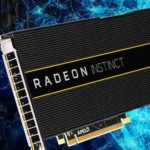[SPONSORED GUEST POST] The AMD HPC User Forum is holding a technical workshop prior to ISC High Performance on Sunday, May 12th, 2024, from 8:00AM – 12:00PM in Hamburg, Germany. The event will cover the AMD Instinct™ MI300 Series products, as well as the ROCm™ stack for HPC and AI. Space is limited and the event is open to all who would like to join ….
HPC News Bytes 20240219: AI Safety and Governance, Running CUDA Apps on ROCm, DOE’s SLATE, New Advanced Chips
Happy President’s Day morning to everyone! Today’s HPC News Bytes races (6:22) around the HPC-AI landscape with comments on: developments in AI security and governance, running CUDA (NVIDIA) apps on ROCm (AMD), DOE’s Exascale Software Linear….
AMD Infinity Hub: Channeling the Power of AMD Accelerators for Faster Time-to-Science
[Sponsored Content] GPUs have revolutionized HPC and AI, carrying advanced performance forward where Moore’s Law dropped off. The result: exploding global demand for the chips. The GPU market reached $87 billion for 2021 with a projected CAGR of 33 percent through 2025, according to a December report by market analyst firm ReportLinker. Combining lightning-fast compute […]
Sylabs releases SingularityPRO 3.5
Today Sylabs announced the release of SingularityPRO 3.5, a popular container platform for HPC, supercomputing, and AI. “SingularityPRO 3.5, released January 21st, 2020, brings exciting new features to the long-term professionally supported version of the container platform. Based on the open source 3.5.2 release, SingularityPRO will receive security and bug fixes for 3 years, making it an ideal solution for the business-driven needs of enterprise customers containerizing their compute workloads.”
Experience The Exascale Era with AMD at ISC 2019
AMD is stepping up with renewed momentum in the HPC market at the ISC 2019 conference this week. “AMD invites you to explore future architecture and ecosystem technologies that are Powering the Exascale Era, and to hear how AMD will help unleash new realms of discovery for HPC with AMD EPYC processors, Radeon Instinct accelerators and the ROCm ecosystem.”
Video: AMD HPC Update
Jay Owen from AMD gave this talk at the HPC User Forum in Tucson. “With the introduction of new EPYC processor based servers with Radeon Instinct GPU accelerators, combined with our ROCm open software platform, AMD is ushering in a new era of heterogeneous compute for HPC and Deep Learning. Truly accelerating the pace of deep learning and addressing the broad needs of the datacenter requires a combination of high performance compute and GPU acceleration optimized for handling massive amounts of data with lots of floating point computation that can be spread across many cores.”
New AMD Radeon Instinct Rolls Out to Accelerate Machine Intelligence
“New Radeon Instinct accelerators will offer organizations powerful GPU-based solutions for deep learning inference and training. Along with the new hardware offerings, AMD announced MIOpen, a free, open-source library for GPU accelerators intended to enable high-performance machine intelligence implementations, and new, optimized deep learning frameworks on AMD’s ROCm software to build the foundation of the next evolution of machine intelligence workloads.”
HIP and CAFFE Porting and Profiling with AMD’s ROCm
In this video from SC16, Ben Sander from AMD presents: HIP and CAFFE Porting and Profiling with AMD’s ROCm. “We are excited to present ROCm, the first open-source HPC/Hyperscale-class platform for GPU computing that’s also programming-language independent. We are bringing the UNIX philosophy of choice, minimalism and modular software development to GPU computing. The new ROCm foundation lets you choose or even develop tools and a language run time for your application. ROCm is built for scale; it supports multi-GPU computing in and out of server-node communication through RDMA.”
Slidecast: For AMD, It’s Time to ROCm!
“AMD has been away from the HPC space for a while, but now they are coming back in a big way with an open software approach to GPU computing. The Radeon Open Compute Platform (ROCm) was born from the Boltzmann Initiative announced last year at SC15. Now available on GitHub, the ROCm Platform bringing a rich foundation to advanced computing by better integrating the CPU and GPU to solve real-world problems.”












